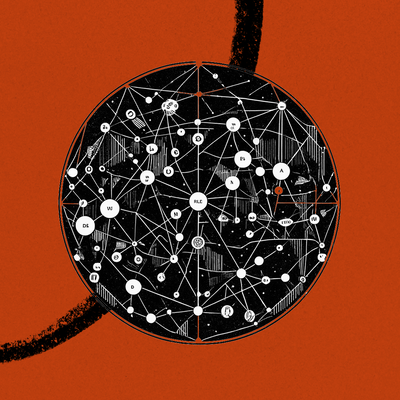
I’m writing a book about the worldview I’ve developed by writing, coding, and living with AI. Last week I published the second piece from it, about how AI will impact science. Here’s the third, about how AI will impact business.—Dan Shipper
Was this newsletter forwarded to you? Sign up to get it in your inbox.
As a young entrepreneur, I once thought of myself as an information processing machine. I got interested in mental models like Clay Christensen’s disruption theory and Ray Dalio's Principles. I took copious notes and spent countless hours organizing them; I felt tremendous pressure to memorize these “rules” so that I could apply them in my business life.
But in doing all this intellectual work, I had a nagging feeling: How would I remember to apply them in the situation that demanded it?
I also saw entrepreneurs around me trying to apply similar rules, with mixed success. It sounds like a bad joke: A Wharton student goes to their first class on negotiation and learns about anchoring, then walks into their next negotiation proposing a price that's 10 times too high because they think it'll properly anchor the potential customer when instead it just pisses them off.
We’re not the only entrepreneurs and capitalists who envy science and rationality and try to apply it to business.
In the late 1700s, Adam Smith, explicitly inspired by Isaac Newton, attempted to discover universal laws of economics—and popularized the idea of the market’s invisible hand. In the early 20th century, Frederick W. Taylor attempted to optimize businesses scientifically, proposing that workers should be studied like machines, with every motion analyzed and improved for maximum efficiency. In the 1970s, Michael Porter’s “Five Forces” framework tried to explain business success as a factor of elementary forces like the bargaining power of suppliers and the threat of new entrants. Christensen’s disruption theory attempted to explain how startups unseat incumbents; his jobs-to-be-done framework is something like an atomic theory for appealing startup opportunities. Eric Reis’s The Lean Startup framed startups as laboratories and entrepreneurs as scientists testing product hypotheses.
We’ve even come to simple, “universal” definitions for the goal of business—maximizing shareholder value—and the fundamental value of businesses: their expected future cash flows.
Why has this way of looking at business been so appealing? First, it is undeniably helpful. Rigorous analytical thinking, reduction, and abstraction are critical to new products and technologies, and to the coordination of people and matter required to operate any kind of business—especially large ones. Second, the total elimination of uncertainty is, for some, the holy grail of business. Guaranteed return, no risk—that would be a great business indeed. An infinite money machine, where all you have to do is pull the lever.
If that’s what you’re looking for—elimination of uncertainty—it is appealing to look for some form of authority to tell you what to do. Science and logic carry the most authority in the modern world. And just like nobody ever got fired for buying IBM, nobody ever got fired for being too scientific, rigorous, and analytical in their thinking.
But as much as reduction and rigorous thinking can be helpful—or even critical—in business, our attempts to turn it into a science like physics are mostly window-dressing, just like our attempts with social sciences in academia.
Many paths to the same result, the same paths to different results
Complex systems like neural networks or human psychology exhibit what’s called equifinality—where many paths can lead to the same result—and multifinality—where the same path can lead to very different results. This applies to business as well.
Take Christensen’s theory of disruption. It mapped quite well to disk drives and steel mills in the late 1980s and early 1990s, where established companies focused on high-end customers while new entrants captured the low end before moving upmarket. However, this pattern doesn't always hold true. Apple's iPhone, for instance, entered at the high end of the market and maintained that position. Netflix started by competing directly with Blockbuster's core business. Disruption theory is useful, but it's less a universal law like gravity and more of a helpful heuristic.
Conversely, copying successful strategies often fails. When JC Penney hired Apple's retail chief Ron Johnson, they attempted to replicate Apple's retail strategy—but the same approach that worked brilliantly for Apple led to disaster for JC Penney.
Business principles are usually anecdotes presented as axioms. Anecdotes—stories—are incredibly valuable. But they get misused when they are assumed to be general laws. In business, what’s most important is to be able to see the landscape clearly for yourself. It’s helpful to know theory and to know history—to take bits and pieces of what has worked for others and apply them to your situation—but usually the best businesses are hard to explain in terms of the past, just like paradigm-shifting scientific ideas are hard to explain in terms of previous theories.
Why is this?
For one, controlled experiments are close to impossible in business. Sure, you can A/B test a headline or a product’s price, but what you choose to test is significantly more important than which test wins. You and I can both use the same A/B testing tool as Mr. Beast to find which YouTube thumbnails will perform better, but Mr. Beast’s will win because he knows the frame or context for a good experiment far better than we do—and what a good frame is must always be partially inexplicit and subject to change.
Beyond that, you can't A/B test major strategic decisions. You can't simultaneously run a company with two different CEOs or expand into two different markets with the exact same resources. The complexity of business environments, with countless variables from market conditions to employee dynamics, makes true scientific experimentation impractical. As a result, cause and effect are very difficult to establish.
For another, business systems exhibit what chaos theorists call “sensitive dependence on initial conditions”—the famous butterfly effect. A small difference in timing, a slight variation in market conditions, or a minor change in team dynamics can completely alter the trajectory of a business decision. These changes can be so small as to be imperceptible; what appears to be the same situation can evolve, over time, into an entirely different outcome.
This points to an even deeper challenge with business laws and principles: They only hold under certain conditions, but those conditions can never be fully specified in advance. Not only does disruption theory not work in the case of the iPhone, but we can't create an exhaustive list of when it will or won't work.
New factors and forces constantly emerge that can invalidate previously reliable principles. Sometimes these are dramatic—like how a global pandemic suddenly made remote-first companies viable in ways that defied conventional wisdom about organizational culture. But often the changes are more subtle: gradual shifts in consumer behavior, technological capabilities, or competitive dynamics that accumulate until, seemingly overnight, old rules no longer apply.
Even more challenging is that the conditions that make a principle work or fail aren't just about external factors but complex interactions between multiple variables. Netflix succeeded by directly competing with Blockbuster because of the specific combination of its team's capabilities, Blockbuster's weaknesses, shifting consumer preferences, and the evolution of broadband infrastructure. Change any one of those variables slightly, and Netflix might not be the dominant streaming platform it is today.
This is why business principles are simultaneously useful and dangerous. They help us make sense of patterns we observe, but the moment we treat them as universal laws, we become blind to what makes them work or fail in any given situation. The key is not to abandon principles entirely, but to hold them loosely—always ready to notice anomalies that signal the game has changed.
Perhaps most challenging of all is the inherent subjectivity in business. Entrepreneurs are encouraged to think objectively about which problems to solve, to do customer research like scientists. But customers rarely tell you directly what to build. Figuring out what people want—really want—calls for grasping two principles from our new worldview: context as priceless and knowledge as participatory. The context of a customer's response is shaped powerfully by what you put in front of them. What you put in front of them is a creative act. And the participatory, creative nature of this process is as essential in business as it is in science, as it is in other areas of life.
This difficulty in creating controlled experiments, sensitivity to initial conditions, vulnerability to hidden exceptions, and the essentially creative nature of new product innovation means that when we call something a “law” of business or a “force,” we’re talking about something inherently different than what we mean when we talk about laws in physics or chemistry. Business "laws" are more like patterns or tendencies that we observe, but they don't have the same predictive power or universal applicability.
So how do we deal with this?
The Only Subscription
You Need to
Stay at the
Edge of AI
The essential toolkit for those shaping the future
"This might be the best value you
can get from an AI subscription."
- Jay S.
Join 100,000+ leaders, builders, and innovators

Email address
Already have an account? Sign in
What is included in a subscription?
Daily insights from AI pioneers + early access to powerful AI tools








.png)
Comments
Don't have an account? Sign up!
Great article. Taking copious notes on Principles or Clay Christensen definitely resonates. I also took courses on PM frameworks such as Blue Ocean etc. It's all good stuff post mortem but the reality is with entrepreneurship... wayfinding per Hoffman or iterative testing based on current conditions is the only way to really move one step forward and closer to the desired outcome.
You've made a compelling case for why "laws" of business are not "laws" in any reasonable interpretation of that word. How axioms, etc. repeatedly fail. You've also well-illustrated how approaching business like now do with LLMs, next move prediction, is a compelling alternative. But you're also trying to say the old rules are still useful, and I feel like that case is much less well-illustrated and supported here. You essentially say "they're still useful just like this thing in LLMs" but not really how, nor why they are compelling in addition to the next-move prediction approach.
I would postulate that most - if not all - business rules are essentially bullshit post-hoc justifications made to either make someone sound smarter/make money on their book/consulting service, or made to make everyone feel more secure about the near-chaos that starting and running businesses actually is (most of the time it's probably both). What's the compelling case for that not being so?
I also feel like the ineffable role of seemingly innate differences in intuition (or other business-critical capability such as decisiveness, etc.) isn't well covered here. Do we have confidence that starting conditions and innate ability *for founders* aren't perhaps literally the most important thing? How much of business success analysis is simply survivorship bias being over-intellectualized? Obviously examples like Jobs and Gates are outliers, but both of them seemed to be "who they were" from early on, Jobs with a strong innate intuition and intense opinions about how things should be from the time he was a teenager. Likewise Gates with the traits that made him successful. Now they're extremes, but that doesn't necessarily mean the same things aren't true about many or most founders if you look closely enough... Or maybe not! 😄 But it seems worth addressing in the context of this line of thinking.
My kingdom for an Edit button! 😅
@Oshyan these are great questions.
1. on most or all business rules being essentially bullshit -> I think if you pursue that case to its logical conclusion you end up saying that skill in business is not a thing, and people get where they are purely because of luck. business rules ARE bullshit when they are portrayed as being universal and comprehensive, but they are NOT bullshit when an experienced practitioner (who has an intuitive, tacit sense of what they actually mean and in what contexts they apply) uses them
2. to be sure starting conditions and innate ability for founders are important, but consider the case where Steve Jobs wasn't able to learn ANYTHING after age 22. like, Steve Jobs as an actual LLM. he would obviously not have achieved what he went on to achieve imo
@danshipper Yes, I'm certainly not trying to make the case that experience does not matter at all. Nor am I actually saying with total confidence that starting conditions are the *most* significant predictor, though I think it's an important consideration to raise in this kind of conversation. I'm being a little provocative but with genuine belief in this possibility and interest in the reality, too.
Regarding business rules, in your scenario of an experienced practitioner, how do you separate out the difference between the rules they express/cite/espouse being merely a post-hoc rationalization of their internal understanding (that may or may not map to some reusable truth, and undoubtedly has significant limits without their internal intuition) and the rules actually being something that they followed to reach their success? Did so and so learn about x business rule and then succeed more greatly because of that? Or did they just pick some rules that mapped reasonably well to their understanding of their own success journey when someone asked them how they succeeded?
I'm not saying it's never the case that someone learns one or more useful business rules and then succeeds dramatically because of that, but I'm interested in how much of the time it does happen because entire industries are built around these kinds of beliefs about business rules, market behaviors, etc. and it feels worth questioning.
I resonated with every words you said. I just came out of GSB and I also find it very dangerous to treat business principles - distilled from a particular business leader's personal pattern recognition - biased by their own experience, as the universal principle.
What you said about finding your own path and way finding also resonated a LOT. For me, this means "Founder-Product" fit. Why am "I" doing this? / What does building this mean to "me"? are questions that I often deprioritize until now. In your previous podcast, you shared how you pivoted from a traditional venture-backed model, to prioritize what makes you more you by writing, and shaping your business around it, that was truly remarkable, and empowering.
I find you the exact person who's similar but many steps down the road, would love to connect and buy you a coffee in SF if you are open to share what I'm building.